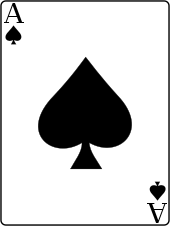Hokm: Difference between revisions
m Correct cap in header and/or general fixes. |
|||
| Line 88: | Line 88: | ||
==External links== |
==External links== |
||
* [http://www.varagh.com Hokm Online Game] |
* [http://www.varagh.com Hokm Online Game] |
||
* [http://apps.facebook.com/playhokm Multi-player Hokm Game on Facebook ] |
|||
[[Category:Whist]] |
[[Category:Whist]] |
||
Revision as of 09:54, 12 July 2010
 | |
| Origin | Iran, Persia |
|---|---|
| Players | 2,3,4 |
| Cards | 52-card |
| Rank (high→low) | A K Q J 10 9 8 7 6 5 4 3 2 |
| Play | Counter-clockwise |
| Playing time | 20 min. |
| Related games | |
| Whist | |
| [1] | |
Hokm (Persian: حُکْم) is a version of the card game Whist played in Iran with four players competing against each other in two teams. It is similar to spades, but there is no bidding, and trump is declared every hand.
Gameplay and Mechanics
Arrangement
The players are organized into two teams of two players each, sitting opposite each other. Players must keep their hands secret from all other players, including their team-mates.
Selecting Hâkem & Teams
There are different method used for finding the Hâkem and team-mates at the start of each match (set of 7 games).
- Deal one card to each player. The player with the highest value card becomes Hâkem, the trump-picker. The player with the second highest becomes his/her team-mate. In case of tie re-deal. This method is the least popular one.
- Deal two cards to each player. The player with the combined highest value cards becomes Hâkem, the trump-picker. The player with the second highest cards becomes his/her team-mate.
- Deal one card to each player and continue to do so until 2 Aces are dealt. The player who receives the first Ace becomes Hâkem, the trump-picker. The player who receives the second Ace becomes his/her team-mate.
Dealer
Dealer would be the person sitting to the left of the Hâkem.
Playing
Partners sit opposite each other. 5 cards are dealt to each player, in groups of 5; dealing and play proceed counter-clockwise. Hâkem picks trump ("hokm") for that hand, based on the suits he's holding at that point (hearts/del, spades/pic, clubs/gishniz or khâj, diamonds/khesht). 4 cards are then dealt out to each player, and then once again 4, so that each player is holding 13 cards and there are none left over. Hâkem leads any card of any suit. Your play must follow suit if able, and any card is legal if you can't follow suit. Highest card of suit led or highest trump takes trick, and trick-taker leads next hand. The goal is to be the first partnership to win 7 tricks (half of thirteen, rounded up). If claiming team makes 7, on the next hand Hâkem remains the same. If the opposing team makes 7, Hâkem becomes the player directly counter-clockwise from Hâkem.
Scoring
Claiming team makes 7+ tricks: 1 point
Claiming team makes 7+ tricks plus opponents get zero tricks: 2 points
Opposing team makes 7+ tricks: 1 point
Opposing team makes 7+ tricks plus claiming team gets zero tricks: 3 points
If one team makes 7+ tricks and keep continue and make next 6 tricks they win the set
A match is played to 7 points.
Strategy
Strategy is different from spades, in that you want to win your tricks early and can't depend on high trumps to necessarily win before the other team gets 7 tricks. Even partnerships with the A through 9 of trump can get shut out . There is a lot more hidden information than spades or bridge, since only one player announces a suit (with an implied 7 trick bid). Also, you can easily be fooled if you are Hâkem by the initial 5 cards, considering you have yet to see most of your hand.
In Iran the game is played by everyone, especially old men, con artists, gamblers and gangsters. Traditionally in money games no conversation or eye contact is allowed, which makes signalling conventions a lot more important than in spades.
Glossary
Kot: Winning the hand by taking all the first seven tricks is called Kot which is worth 2 points.
Hâkem Koti: If you or your team could Kot the Hâkem player or team (impossible mission) then it's called Hâkem Koti which is worth 3 points.
Hokm Lâzem: To lead a trump card which obliges other players to play a trump card.
Boridan: (literally 'to cut' - cf. French 'couper') To win a trick by playing a trump card when you are void of the suit led.
Rad Kardan: (literally 'to bypass') Not to play a trump card when you are void of the suit led, because you are quite sure that your partner will win the trick. Pâyin Âmadan: (literally 'to lay low') To play a low card because you are quite sure that your opponent will win the trick.
Bâlâ Âmadan: (literally 'to lay high') To play a high card in order to make the next player play a higher card if he can.
Rafeh Koti: When a player knows his hand is bad, this is a card play at the beginning of a game in which the best card is played in hopes to attain one trick and avoid a kot.
